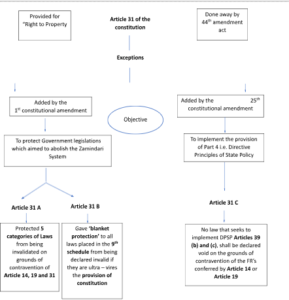This article 35 establishes the authority to legislate regarding specific fundamental rights, which is solely vested in the Parliament, excluding state legislatures. Its purpose is to maintain consistency throughout India concerning both the nature of these Fundamental Rights and the penalties for their violation.
Article 35 states that only the Parliament (and not state legislatures) has the authority to enact laws concerning:
-
- Prescribing residence: According to Article 16, only the Parliament can determine residency as a requirement for certain employment or appointments in a state, union territory, local authority, or other entities.
- Empowering courts: As per Article 32, only the Parliament can empower courts other than the Supreme Court and high courts to issue various directions, orders, and writs for the enforcement of fundamental rights.
- Application of FR: Under Article 33, only the Parliament is authorized to limit or repeal the application of Fundamental Rights for members of the armed forces, police forces, and similar entities.
- Indemnification: Article 34 assigns the Parliament the authority to protect any government employee or individual from liability for acts performed during martial law operations in any region.
- Penal provisions under FR: The Parliament holds the power to create laws that define the penalties for actions deemed offenses under the fundamental rights, such as Article 17 (untouchability) and Article 23 (trafficking in human beings and forced labor).
- Changing pre-constitutional laws: Any laws that were in effect at the time the Constitution came into force regarding the mentioned matters will remain valid until changed, repealed, or amended by the Parliament.
It is important to highlight that Article 35 broadens the Parliament’s ability to legislate on these specified matters, even if some may be categorized under the State List.
Exception to Fundamental Rights
There are three provisions in part III of the constitution of India itself that act as exceptions to fundamental rights.
| Article | Subject Matter |
| Art. 31 A | Saving of Laws Providing for Acquisition of Estates, etc. |
| Art. 31 B | Validation of Certain Acts and Regulations |
| Art. 31 C | Saving of Laws Giving Effect to Certain Directive Principles |

Article 31 A: Safeguarding Land Reforms and State Authority
- Background: After Independence, the Congress party came to power at the centre and started taking steps to abolish the Zamindari system (by acquiring the lands of Zamindari). The biggest impediment to the Zamindari abolition programmes of the Government were the provisions of Article 31 (Right to Property). They required the Government to pay ‘just compensation’ before acquiring land. The Judicial pronouncements had put the Zamindari abolition programmes in danger, for example the Bihar Land Reforms Act was struck down as it violated Article 14 by classifying Zamindars in a discriminatory manner.
- Government step: To overcome this issue, Article 31 A was added by the 1st constitutional amendment act. It protects five types of laws from being contested and potentially deemed unconstitutional due to violations of the fundamental rights outlined in Article 14 and Article 19 (Initially Article 31 was included but was later removed by the 44th constitutional amendment act).
The categories include:
- The State’s acquisition of estates and associated rights;
- The State’s takeover of property management;
- The merging of corporations;
- The cancellation or alteration of rights held by directors or shareholders of corporations; and
- The cancellation or alteration of mining leases.
Article 31 B: Ninth Schedule and Judicial Safeguards
- Provisions: In addition to Article 31 A the 1st constitutional Amendment also added Article 31 B. It provided blanket protection to all laws which were put under the 9th schedule against the provision of Article 13. Article 13 stated that any law that conflicts with or undermines fundamental rights will be rendered invalid. Therefore, it serves as the foundation for the power of judicial review.
- Objective: Since they were added as a part of Article 31 the purpose was to protect the legislation of Parliament which aimed to bring land and agrarian reform via land acquisition etc.
- Concerns: But the provision has been misused with laws unrelated to land reform like revenue laws, Reservation laws example Tamil Nadu reservation for backward classes and Schedule Tribes etc. being provided the blanket protection under the 9th schedule. The applicability of Article 31B is broader than that of Article 31A since it protects any law listed in the Ninth Schedule from fundamental rights scrutiny.
- Supreme court Judgement: In I.R. Coelho case (2007) (famously known as the 9th schedule act), Supreme Court ruled that even the laws under 9th Schedule would be open to judicial review if they violated Fundamental Rights or undermined the fundamental framework of the Constitution.
Article 31 C: Balancing Directive Principles and Fundamental Rights
- Background: The 25th Constitutional Amendment Act of 1972 introduced a new Article 31-C.
- Objective: The objective of the article was to get over the difficulties placed by Judicial decisions in giving effect to Directive Principles of State Policy mentioned under Part IV of the constitution.
- Provisions: This provision includes two clauses: it asserts that laws aimed at realizing socialistic directive principles outlined in Articles 39 (b) and (c) cannot be deemed invalid due to violations of the Fundamental Rights prescribed by Article 14 and Article 19. Additionally, any law that includes a statement that it is intended to implement such policies cannot be challenged in any court on the basis that it fails to achieve such a policy. This second clause, which restricted judicial review, was annulled by the Supreme Court in the landmark Kesavananda Bharati case.
|
||||||||||














